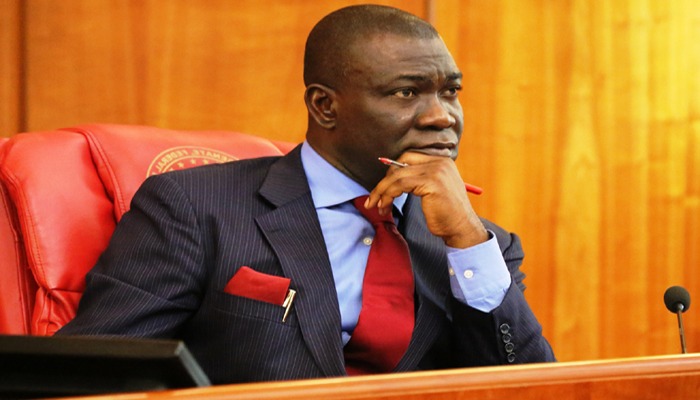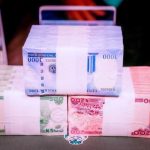...To get all news updates, Join our WhatsApp Group (Click Here)
Also Join our WhatsApp Channel (Click Here)
Focus on the electoral contest next month may have shifted it off the front burner. Still, Nigerians should pay keen interest regarding the jail and indefinite detention of former Deputy Senate President Ike Ekweremadu by a London Court. The many issues involved in the matter are unfolding daily and concerning the citizenship of Nigerians, the role of the sovereign, rights and responsibilities and how government agencies function.
British authorities arrested Ekweremadu in mid-2022 for alleged intention to harvest the organ of a young man as a donation to save his daughter’s life. The young man agreed with the Ekweremadus on the missiqon but turned against them in London. He claimed to be a minor. Facts on the ground so far show that he lied brazenly.
Curiously, the London High Court refused Ekweremadu bail. The Economic and Financial Crimes Commission of Nigeria was the instigator that wrote to the court not to allow Ekweremadu out on bail for a bailable offence. EFCC then got an interim forfeiture order from Mr Justice Inyang Ekwo at an Abuja High Court seeking to seize forty (40) properties it insinuated Ekweremadu acquired illegally and corruptly.
Mr Justice Inyang Ekwo of the Abuja High Court granted the exparte order in November 2022. On Friday, 20 January 2023, he cancelled the interim forfeiture order granted against Ekweremadu on the 40 landed properties. Mr Justice Ekwo discovered that EFCC obtained the order fraudulently by concealing information. Ekwo said EFCC knew Ekweremadu was in lawful custody in the United Kingdom but failed to make the vital information available to the court.
Mr Justice Inyang Ekwo agreed with Ekweremadu’s counsel Chief Adegboyega Awomolo that Ekweremadu could not possibly defend his alleged ownership of the properties while in detention in the UK.
Justice Inyang Eko stated, “I have been asking myself the question repeatedly: How can a citizen of Nigeria who is incarcerated outside the country, to the respondent’s knowledge, be expected to show cause in action in Nigeria brought by the respondent?
“How do you help tie down a man and initiate a fight and demand that the same man you helped tie down must defend himself?”
We tackled this subject in November 2022. The Public Sphere declared that “the EFCC has failed to prove illegality. The Nigerian state has deployed underhand tactics. EFCC got a court declaration by sleight of hand after previous failures in the normal court process to indict Ekweremadu”.
Now the court has affirmed my layman’s verdict. Justice Ekwo added, “I do not think that the desired objective of the legislature in enacting the provision of Section 17 of the Advance Fee Fraud and Other Related Offences Act (AFFOROA), 2006 relied upon by the respondent (EFCC) in initiating the proceeding to obtain an ex parte order of interim forfeiture order was for the provision to be used in any circumstance where the person affected is not in a position to defend himself or show cause as required.
He disagreed with the EFCC’s argument to force the matter.
“I do not think that this position is correct. The requirement to file an affidavit to show cause, under S. 17 of the AFFOROA, 2006, will hold strong in a normal situation where the person required to do so is not fettered by any act, condition or situation that amounts to a deprivation of the right to show cause as required by law.
“This, in my opinion, is an unconscionable act. The respondent’s act shows that this action was brought in bad faith. In law, bad faith entails dishonesty of belief or purpose”.
The court noted the existence of other claimants to the 40 properties EFCC alleged belonged exclusively to Ekweremadu. They include the Anambra State government that filed a claim.
The honesty of Justice Inyang Ekwo is refreshing. He called out the EFCC for dishonesty, duplicity and bad faith, and the deceit angered him. Kudos to Justice Ekwo for showing that the colour of Nigerian justice is not only red.
There are more significant concerns about the treatment of Mr Ike Ekweremadu. Remember that Mr Ekweremadu is a ranking member of the Senate and was its Deputy President. What happens to ordinary folks if Nigeria can throw such an influential citizen to the dogs? Who has such a bitter issue with Mr Ekweremadu that requires disgracing Nigeria and ignoring all consular protocols? What kind of state is Nigeria if high-ranking citizens cannot get assistance from home in their trials outside our shores, not to mention ordinary citizens?
The Nigerian state is enjoined to protect citizens, maintain law and order, protect the fundamental human rights of citizens and maintain external relations that provides cover for citizens wherever they are in the world. It is not within contemplation that state organs such as the EFCC would load the dice against citizens and go out to bend justice to serve nefarious purposes. Indeed, state organs must observe the insurance rule of The Neighbour Principle. Developed by Lord Atkin, the Neighbour Principle stipulates a duty of care. “The principle is that one must take reasonable care to avoid acts or omissions that could reasonably be foreseen as likely to injure one’s neighbour. A neighbour is someone who was so closely and directly affected by the act that one ought to have them in contemplation as being so affected when directing one’s mind to the acts or omissions in question,” according to the Law Dictionary.
Even in the pursuit of its core duty of maintenance of law and order, state organs have a duty of care to citizens and must observe the neighbour principle. EFCC fell far short in the Ekweremadu matter. They should remedy their misbehaviour urgently.
By: Chido Nwakanma
You can get every of our news as soon as they drop on WhatsApp ...To get all news updates, Join our WhatsApp Group (Click Here)
Also Join our WhatsApp Channel (Click Here)

















